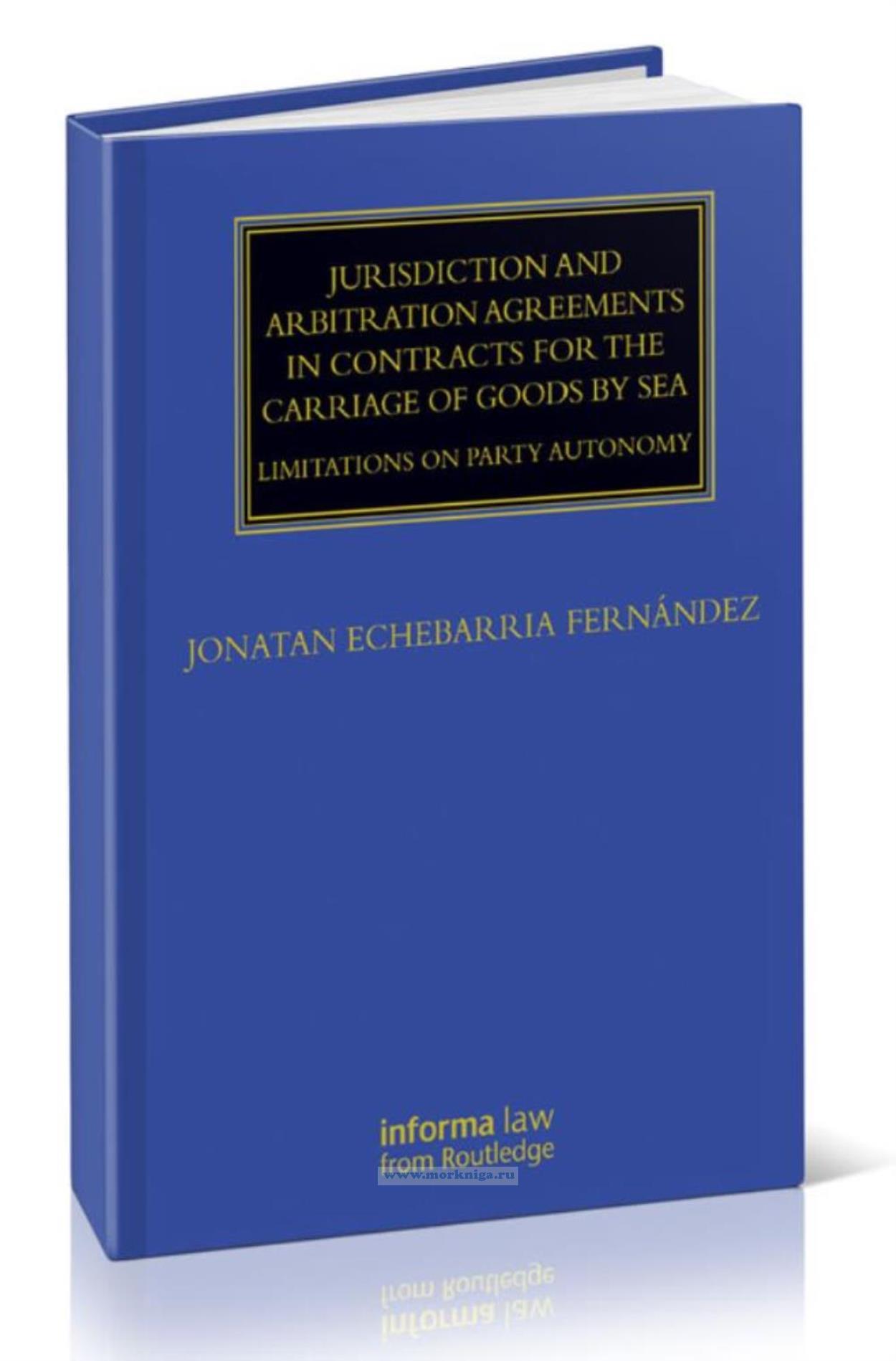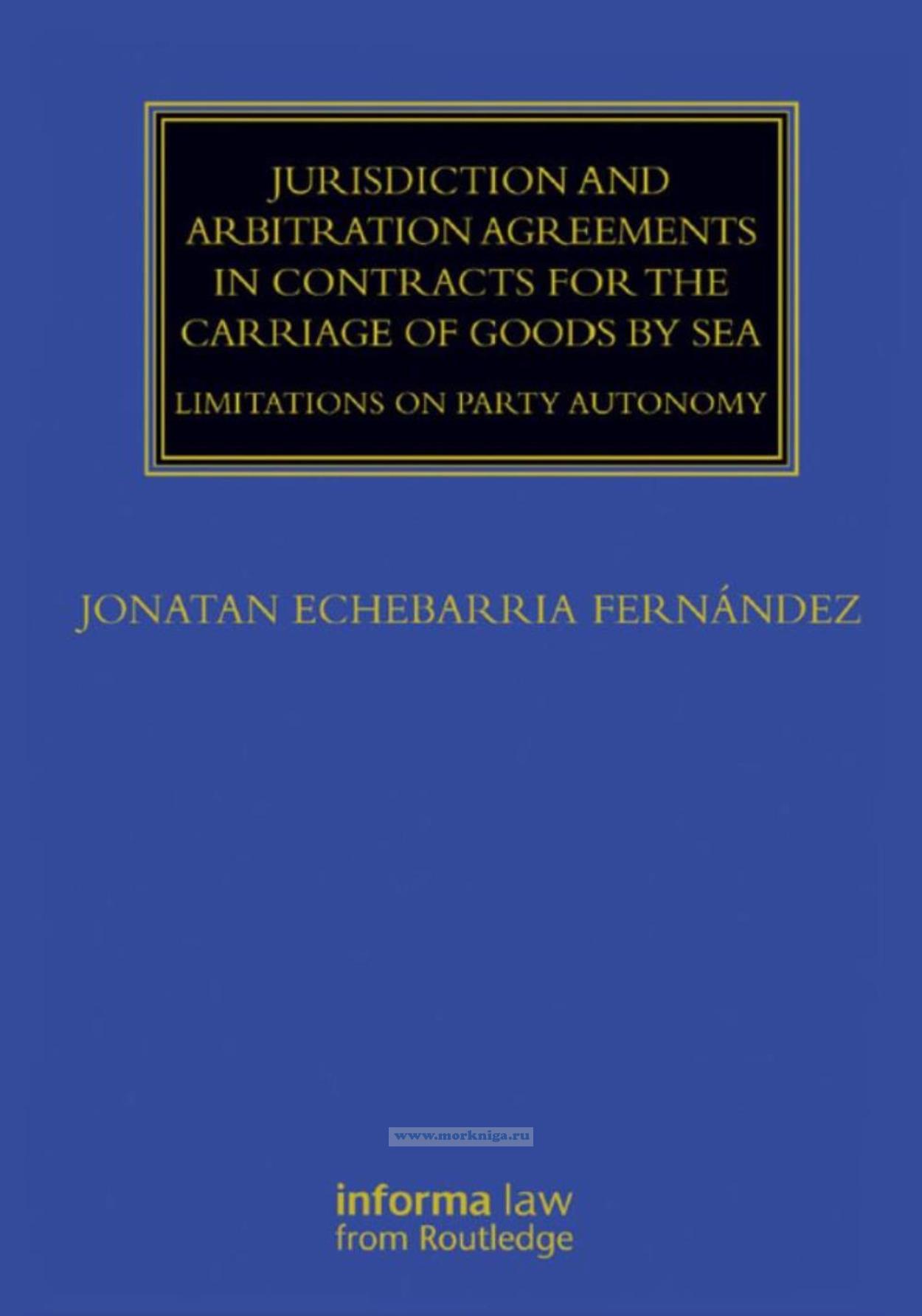Jurisdiction and Arbitration Agreements in Contracts for the Carriage of Goods by Sea. Limitations on Party Autonomy/Юрисдикционные и арбитражные соглашения в договорах морской перевозки грузов. Ограничение автономии сторон
Издание на английском языке
The carriage of goods by sea is the globally preferred method of international cargo transportation.1 When a buyer and a seller agree on a contract for the sale of goods, they must set all conditions of purchase, including the transport of such goods by land, air or sea. Maritime transport documents (primarily charterparties and bills of lading (B/L)) are relatively complex and the uncertainty concerning dispute resolution clauses deserves particular attention.2
This book focuses on cargo claims related to the damage, loss, misdelivery or delay of merchandise during a sea venture. It sheds light on especially problematic scenarios, in which parties to the carriage contract might not be able to resolve their disputes, and examines the interface between party autonomy and dispute resolution clauses in B/Ls and charterparties in the context of restrictions imposed by different legal regimes in relation to procedure, substantive law and choice of law.
Contents
Foreword
Foreword by Alfonso-Luis Calvo Caravaca and Javier Carrascosa Gonzаlez
Acknowledgements
List of abbreviations
Table of cases
Table of legislation
Chapter 1 Introduction
1 Limitations on party autonomy: background
1.1 The parties
1.2 The contracts
1.2.1 Vessel-oriented contracts: the charterparty
1.2.2 Cargo-oriented contracts: the bill of lading
2 Party autonomy
2.1 Procedural party autonomy
2.2 Substantive party autonomy
2.3 Conflictual party autonomy
3 The problem with party autonomy
3.1 What are the limits on party autonomy regarding jurisdiction and arbitration clauses?
3.2 When does the arrest of the ship frustrate the jurisdiction or arbitration agreement of the parties?
3.3 When is the validity of a jurisdiction or arbitration agreement restricted by the substantive applicable law of the forum, including overriding mandatory rules?
4 Sources of law and the impact of Brexit
4.1 International treaties
4.1.1 The Hague–Visby Rules
4.1.2 The Hamburg Rules 1978
4.1.3 The Rotterdam Rules
4.1.4 The Hague Choice of Court Convention
4.1.5 The 1952 Arrest Convention and the 1999 Arrest Convention
4.1.6 The New York Convention
4.2 ‘Soft law’: customs and usages
5 Limits of this work
6 Conclusions
Chapter 2 International jurisdiction and arbitration
1 International jurisdiction in the EU
1.1 Separability of the jurisdiction clause from the main contract
1.2 Brussels I Regulation (recast) in the EU
1.3 Prorogatio fori and derogatio fori under the Brussels I Regulation (Recast)
1.4 Declining jurisdiction, lis alibi pendens and related claims in the EU
2 International arbitration
2.1 Introduction to alternative dispute resolution
2.2 Maritime arbitration
2.3 The New York Convention
2.4 The doctrine of separability of the arbitration agreement from the contract
3 International jurisdiction and arbitration in maritime conventions
3.1 The Hague–Visby Rules
3.2 The Hamburg Rules
3.2.1 Jurisdiction under the Hamburg Rules
3.2.2 Arbitration under the Hamburg Rules
3.3 The Rotterdam Rules
3.3.1 Jurisdiction under the Rotterdam Rules
3.3.2 Arbitration under the Rotterdam Rules
3.4 Remarks on the Hamburg and Rotterdam Rules
3.5 Future directions on multimodal transport
4 Conclusions
Chapter 3 Incorporation of dispute resolution clauses contained in the charterparty into the bill of lading
1 Incorporation of charterparty terms into the bill of lading
2 Incorporation of dispute resolution clauses in England
2.1 Incorporation of jurisdiction clauses in England
2.2 Incorporation of arbitration clauses in England
2.3 The effect of Brexit on incorporation of dispute resolution clauses
3 Incorporation of dispute resolution clauses in Spain
3.1 Incorporation of jurisdiction clauses in Spain
3.1.1 Jurisdiction agreements in favour of EU courts
3.1.2 Jurisdiction agreements in favour of non-EU courts
3.2 Incorporation of arbitration clauses in Spain
3.3 Transferability of a foreign jurisdiction clause contained in the B/L to third parties under Spanish law
4 Incorporation of dispute resolution clauses under EU case law
5 Conclusion
Chapter 4 Anti-suit injunctions
1 Anti-suit injunctions and jurisdiction agreements in England
1.1 Anti-suit injunctions and jurisdiction agreements under Brussels I Regulation 44/2001
1.2 Anti-suit injunctions restraining the parties from commencing proceedings outside the EU
2 Anti-suit injunctions and arbitration agreements
2.1 Anti-suit injunctions and arbitration agreements under the old Brussels I Regulation 44/2001
2.2 Anti-suit injunctions and arbitration agreements under the Brussels I Regulation (Recast)
2.3 Anti-suit injunctions restraining parties from commencing proceedings outside the EU
3 Conclusion
Chapter 5 Party autonomy and the arrest of ships
1 Ship arrest as an interim measure
1.1 Nature of actions in rem under civil law and common law
1.2 Requirements for an arrest
2 Arrest of ships in the EU
2.1 Compatibility of the Arrest Conventions with the Brussels I Regulation (recast)
2.2 The arrest of ships of contracting and non-contracting states to the Arrest Conventions
2.3 Jurisdiction for arrest in non-EU states
2.4 Jurisdiction for arrest in another EU Member State
2.5 The validity of the jurisdiction or arbitration clause for provisional measures
3 The arrest of ships: a comparative perspective
3.1 Arrest of ships in England
3.2 Arrest of ships in Spain
4 Arbitration and the arrest of ships
4.1 Party autonomy and shipping arbitration
4.2 A procedural approach to maritime arbitration in England
4.3 Arbitral powers to request the arrest of ships in Spain
5 Can the court keep the case at the agreed court under the 1952 Arrest Convention?
6 Van Uden: a real connecting link between subject matter and forum
7 Forum shopping and the arrest of ships
8 Conclusions
Chapter 6 Public policy and mandatory rules: limitations on party autonomy
1 Mandatory rules, public policy and overriding mandatory rules
2 The incompatibility of an imperative norm with a jurisdiction agreement
2.1 Incompatibility under the Brussels I Regulation (recast)
2.2 Intra-EU jurisdiction agreements
2.3 Extra-EU jurisdiction agreements and imperative rules
2.4 Effects of forum selection agreements and effectiveness of imperative norms
3 Validity of arbitration agreements and incompatibility with public policy
4 Conclusion
Chapter 7 Conclusions and a new perspective
1 Procedural matters
2 Privity of contract
3 Forum shopping, irreconcilable judgments and lis alibi pendens
4 Restrictions on jurisdiction and arbitration clauses
5 Perspectives for a new specialised convention on maritime matters
Annex I: Bibliography
Annex II: Additional legal sources
Annex III: Official reports and preparatory works
Annex IV: Additional cases
Index

